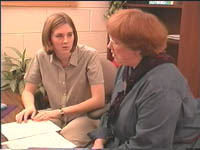 By Griffin Myers, Writing Consultant
By Griffin Myers, Writing Consultant
This week I asked Griffin, who is overseeing a proofreading project for our Writers’ Web online handbook, to discuss what she’s seen among peers.
Only bad writers use the Writing Center:
Students of all experience levels can benefit from visiting the Writing Center. Sometimes even just a second set of eyes can pick up errors that the author’s mind may not notice. Writing consultants also have training and experience with a wide variety of paper types, so can help out with unfamiliar formats or with particular professor pet peeves. Even consultants go into the center, because we understand how helpful an educated peer editor can be!
English isn’t my first language and the consultants might judge me:
Actually, English-language learners make up a significant portion of the students who come through our center. Writing consultants are trained in how to break down errors in to patterns and can therefore address foundational confusions instead of simply fixing problems on a case to case basis. This can be helpful for any writer but especially for those still grasping the syntax and contradicting rules of the English language. We can also help you get in touch with teachers with ESL specific training, as well as those writing Consultants who have more experience with teaching English to speakers of other languages.
The Consultants will proofread my paper:
The Writing Center does not do grammar checks. Rather, we will look at your paper holistically to suggest areas of improvement from everything from format to content to yes, grammar. Our goal is to help writers recognize and correct potential weaknesses in their own writing, rather than to simply have a Consultant check off spelling and send the writer on their way. This isn’t to say that we will not help writers with grammar: Consultants will just work with the writer to develop a better understanding of grammar, instead of just fixing case by case mistakes.
I have to have a completed draft:
Writing Consultants can help with every step of the writing process, from developing and organizing an outline, to analyzing an old graded paper to shore up weak spots together. One caveat is that the more prepared the writer is when they come into the appointment, the more the Consultant can help the student.
The Consultants are only for FYS classes:
We have in class Consultants in classes at all levels! Additionally, our Writing Center is open to everyone, regardless of current class.
The Consultants are only for English classes:
Our Consultants have a wide knowledge base that can be applied to almost any subject to improve writing quality. Additionally, if you have a specific subject that you would like help on, check out our list of Consultant majors online: one of us is likely taking the same major!
I can only go to the Writing Center for class assignments:
While sometimes a specific teacher will send you to the Writing Center with an assignment, we exist to help you, the student! This means from theses to job applications, we are happy to lend a helping hand for all of your writing needs.
The Writing Center is only for undergrads:
Any Richmond student, including SPCS students, are welcome at the Writing Center. Can’t come by at all? Try reaching out to one of our Consultants and see if they can meet on campus at a later hour, or if they’re willing to provide assistance via email.


